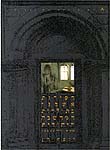|
Discipline:
Humanities
Topic: Judaic Studies
Ashkenazi Hasidism in the History of Jewish Thought
|
Joseph Dan
|

|
The Ashkenazi Hasidic movement, which flourished
mainly in the 12th and 13th centuries, created one of the central phenomena
in Jewish thought in the Middle Ages. Its developers and teachers laid the
foundation for a comprehensive theology with esoteric and mystical
overtones, transmitted from generation to generation as an occult religious
outlook in Ashkenazi Judaism. At the same time it engendered a popular
school of moral philosophy which, to a large extent, shaped the religious
and moral life of Ashkenazi Judaism.
|
|
This 3-volume series focuses on milestones in
the history of the movement, its esoteric and occult aspects, and its
extensive moral doctrine.
Volume 1: Ashkenazi Hasidism in the history
of Jewish thought; historical background: relations between Jews and gentiles
as reflected in the literature of Ashkenazi Hasidim; The Book of the
Hasidim (1990, 368 pp., cat. # 10297-1)
Volume 2: Main concepts of the
Ashkenazi-Hasidic moral doctrine; the repentance doctrine of Ashkenazi Hasidism;
moral behavior in the social arena in Ashkenazi Hasidic religious thought;
fictional literature; hagiography (1990, 292 pp., cat. # 10297-2)
Volume 3: The concept of God; honor and revelation; the
Creation and the legend of the Golem; philosophy of providence and the
problem of “Secrets of Prayer” (1990, 272 pp., cat. # 10297-3)
|
|
|
Professor Joseph Dan,
Gershom Scholem
professor of Kabbala at the Hebrew University of
Jerusalem, received the 1997 Israel Prize for his studies on the history of
Jewish mysticism, thought, ethics, and literature. One of the world's
leading authorities on Jewish mysticism, his numerous publications include The
Heart and the Fountain: An Anthology of Jewish Mystical Experiences
(Oxford University Press, 2002).
|

For additional
information, contact the Rights and
Permissions Department.
|